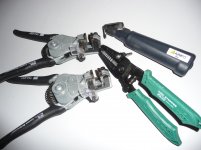Can anyone recommend a specific brand auto adjusting wire stripper for smaller wires?
My collection attached. Two pairs of the 'Stripmaster' type - 0.05mm2 to 0.5mm2 on one, and 0.75mm2 to 6mm2 on the other, no need to change blades; depth stops are really handy.
These are v good, but the drawback is the minimum wire length, due to the size of the jaws that seize the wire - need 18mm (plus the stripped length), more if the wire is buried among many others, eg on multicores.
Pictured 'Engineer' PA-14 bought for that reason, good results too; I recommended their mini- and micro-crimp tools just yesterday on a sep thread.
They're not auto adjusting, but - if I understand correctly that you mean something that squeezes flat blades the 'correct' amount so as not to damage the conductors - they don't need this. PA-14 and Stripmasters have circular blades that cut cleanly all round without strand damage.
HTH,
AP
PS Also pictured: 'Tor' for stripping outer jackets. Min cable dia: 4.5mm, Max cable dia: 40mm (with larger hook); max jacket depth: 4.5mm. Also recommended.
Attachments
Soldering house wires is not done today (I see it in old books). I do not think it is forbidden. I have heard that in a violent short, the molten solder fling-around does added damage. Obviously the main thing is that Wire-Nuts are so much less trouble to install and (if done right) trouble-free even at brutal current. I soldered a 50 Amp feed wire in my tractor's new fuse-box.
High current (50A to 5000A for example) should not be soldered. The solder can melt from the current and then arc which can start a fire and it goes downhill fast from there. In the US "split bolts", a special clamp, are used for high current connections. I suppose you could weld the copper but that's not too practical. In my "electric shop" training a long time ago, they showed us how to splice wires. No solder, just a special twist and lots of "friction" tape. Those joints are still working in many 100+ year old houses. But not what I would use for running an electric range.
I'm not even clear that split-bolts are legal, though they sure are widely used. (EDIT: They are UL and CSA listed.)
There are much better splices for high current.
Twist-tape "can" be reliable in dry places. Depends on skill and obsession. The time to make one for-sure forever-good twist splice, you cudda done several wirenuts.
Grounding conductors are sometimes welded with a Thermite-like process. Key ground conductors may not be spliced, but thermal welding is excepted. Ground bonds will rarely carry much current but in a fault the current may be BIG. And they are not fused, and a fuse would be less-safe. A welded connection is as good as the rest of the run, while any other splice may be a weak-spot and fail when most needed.
There are much better splices for high current.
Twist-tape "can" be reliable in dry places. Depends on skill and obsession. The time to make one for-sure forever-good twist splice, you cudda done several wirenuts.
Grounding conductors are sometimes welded with a Thermite-like process. Key ground conductors may not be spliced, but thermal welding is excepted. Ground bonds will rarely carry much current but in a fault the current may be BIG. And they are not fused, and a fuse would be less-safe. A welded connection is as good as the rest of the run, while any other splice may be a weak-spot and fail when most needed.
Last edited:
This welding is UK practice..............Grounding conductors are sometimes welded with a Thermite-like process. Key ground conductors may not be spliced, but thermal welding is excepted.................
It is used to interconnect the grid of Earthing rods to meet the "Earthing requirements" of the installation.
There is/are a test point break/s in the grid so that resistances through the copper/ground can be measured from one part of the grid to another part.
- Status
- This old topic is closed. If you want to reopen this topic, contact a moderator using the "Report Post" button.
